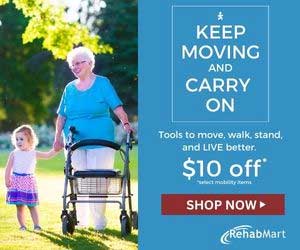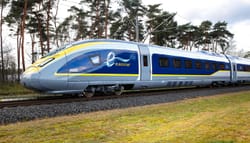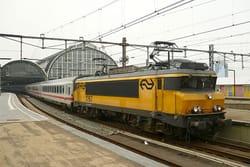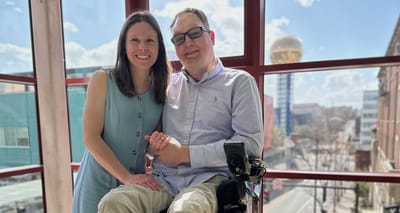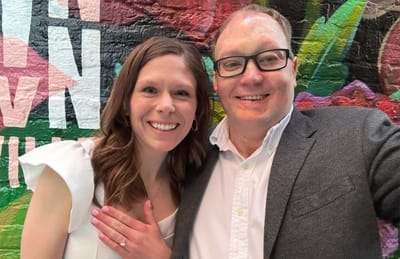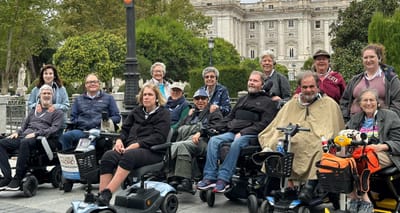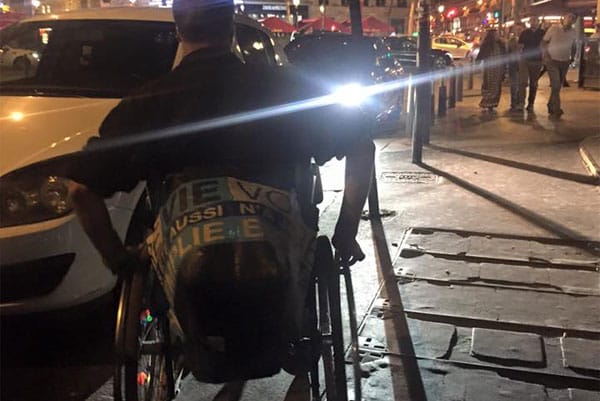
It wasn’t the taste of a spectacular glass of champagne or the sight of the Eiffel Tower. It was a chance meeting with a man.
I was out on a stroll (roll) just a few hours after arriving in Paris. Not 5 minutes in, I crossed paths with another wheelchair user. He is a Romanian. In a past life, he was a husband and father. He became disabled, after what must have been a horrible accident involving fire. He was abandoned and cast aside — even by his own wife. Now, he is a panhandler, seeking out the generosity of others to survive.
I too am a burn survivor. Our shared experience allowed us to connect through understanding. My injuries were extensive and led to three amputations. I was fortunate to be left with a healthy, dominant left hand. This man’s hands are missing fingers. He lost a leg. His facial scarring is severe. But, he possesses a spirit that is unconquered.
Ten minutes into our meeting, I asked for his name. He motioned to his breast and said, “Heart.” Confused, I asked again.
“It doesn’t matter,” he said. “I am my heart.”
Let that sink in for a moment. I did. I realized that my worldly identity means nothing. What resides in my heart is what determines who I am.
He asked me to follow him down the street. I didn’t realize until we had arrived that he was taking me to his home.
He lives on the Champs-Elysées, the posh avenue which connects the Louvre Museum and the Arc de Triomphe. He is not staying in a fine hotel like the one I will enjoy this week. Every night, he makes his bed by the door of a shop on the Rue du Colisee.
He pointed to the ground, at a loaf of bread. “The owner leaves this for me.”
I thought again of that heart. I told him that he inspires me and is a good man. I told him that his strength was heroic.
Gesturing to the sky, he said, ” I only live because of God. That’s life.”
I made the sign of the cross, saying a silent prayer for my new friend, “Heart.” He came closer, locked his wheels and embraced me. He cried. I cried. He held me tighter and kissed my cheek. I kissed his.
“No one respects me,” he said. “No one loves like God. I am Orthodox.”
I told him about my Roman Catholic faith. How I credit the love and teachings of God for my own recovery. He nodded in agreement.
I told him that I wanted to share his story with my friends. I asked to take a photograph with him, but he declined. I understood.
“We have God as friend,” he said.
Some minutes later, and it being nearly 1:00 a.m., I told him goodbye. As I started to roll away, I heard, “I am Livio.” I could only smile and continue on. He will always be “Heart” to me.
After we parted, I thought about what he had told me through the tears: “No one respects me.” I’ve always struggled to define respect for the disabled, as it is new territory for me. Is it a lack of respect when an able-bodied person believes a wheelchair user to be incapable? Is it disrespectful to make assumptions about a person’s abilities or inabilities? These are difficult questions, with complicated answers. Yet, I was only a few minutes away from understanding what he meant by respect.
As I approached my hotel, I saw at least 10 people walk through its front door without issue. When I arrived, the bellman stepped in front of me and demanded to see my key. Wow. Am I unfit to stay at a nice Parisian hotel because I am a person who uses a wheelchair? Or, am I just less fit than those who came before me?
I have always wondered what the greater purpose for my car accident was. Tonight, as I handed over my room key, those questions of “why” were answered. The purpose and reason for it all was made clear. All of us have value. God knows it, so why doesn’t society? The disabled community needs loud voices. I can be one of those. Through this website, and through my own personal activism, I believe I can help to eradicate the stigma that is attached to disability. My heart is in it.
Will you join me?








